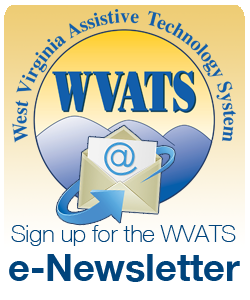You and Your Service Animal
Download a PDF of this Document
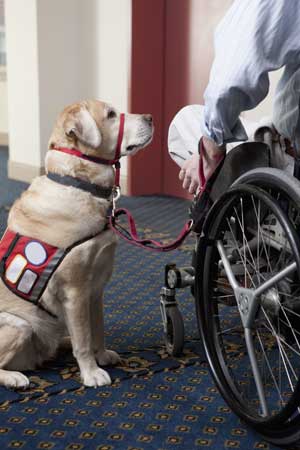
This information was adapted by WVATS from the Department of Justice and other sources to provide an easy reference to service animal information.
What is a Service Animal?
A service animal is an animal that has been trained to do work or tasks for a person with a disability.
What Type of Animal Can Be a Service Animal?
Only dogs and miniature horses can be service animals under Title II and Title III of the Americans with Disabilities Act. However, the definition of service animal can be different under different laws. For instance, the definition of "assistance animal" under the Fair Housing Act or other state and local laws can include other types of animals.
Are Animals that Provide Comfort or Emotional Support Considered Service Animals?
Animals whose only function is to provide comfort or emotional support are not considered service animals under the ADA.
What Type of Work Should a Service Animal Be Able to Do?
Service animals must be able to do work or tasks directly related to the person's disability such as:
- Guiding people who are blind
- Alerting people who are deaf
- Pulling a wheelchair
- Alerting and protecting a person who is having a seizure
- Reminding a person with mental illness to take prescribed medications
- Calming a person with post traumatic stress disorder (PTSD) during an anxiety attack
Where Can a Service Animal Go?
Generally, service animals can go anywhere the general public is allowed to go. For example, in a hospital service animals should be allowed to go in areas such as patient rooms, clinics, cafeterias or examination rooms. However, they may not be allowed in operating rooms or burn units where they may affect a sterile environment.
What Does the ADA Require to Keep Service Animals Under Control?
The ADA requires that service animals must be harnessed, leashed or tethered. If these devices interfere with the service animal's work or if the individual's disability prevents using these devices, then the individual must maintain control of the animal through voice, signal or other effective controls.
What Type of Questions Can You Ask About a Service Animal?
When it is not obvious what service an animal provides, you may only ask two questions:
- Is the service animal required because of a disability?
- What work or task has the service animal been trained to perform?
You cannot ask about the person's disability, require medical documentation, require a special identification card or training documentation for the dog or ask that the dog demonstrate its ability to perform the work or task.
Allergies and fear of dogs are not valid reasons for denying access or refusing service to people using service animals.
A person with a disability cannot be asked to remove the service animal from the premises unless one or more of the following has occured:
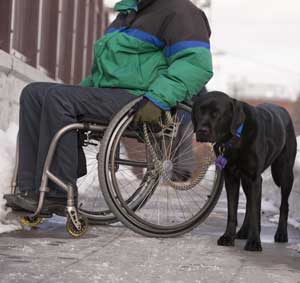
- The animal is out of control and the handler does not take effective action to control it
- The animal is not housebroken
When there is a legitimate reason to ask that a service animal be removed, you must offer the person with the disability a chance to obtain goods or services without the animal's presence.
Establishments that sell or prepare food must allow service animals in public areas even if state or local health codes prohibit animals on the premises.
People with disabilities who use service animals cannot be isolated from other patrons, treated differently from other patrons or charged fees that are not charged to patrons without animals.
People with disabilities who use service animals cannot be isolated from other patrons, treated differently from other patrons or charged fees that are not charged to patrons without animals.
If a business such as a hotel normally charges guests for damage caused by a pet, a customer with a disability may also be charged for damage caused by him or his service animal.
Business staff is not required to provide care or food for a service animal.
Proper Care of Service Animals
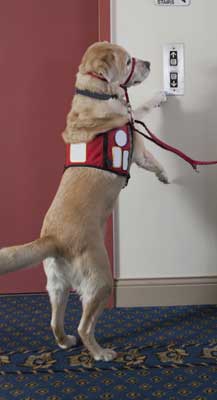
Having a service animal can be an asset to a person with a disability but it is also a responsibility.
The International Association of Assistance Dog Partners recommends the following:
- Know important canine laws (i.e. leash laws and public access laws)
- Ensure the dog is healthy, is flea free and has rabies shots that are up to date
- Make sure the dog is well groomed and free of any foul odor
- Show respect and consideration to other people and property
- Monitor the dog's stress level; provide rest breaks
- Carry clean up materials; arrange for prompt clean up if a dog eliminates or gets sick
- Be polite and willing to educate the public about assistance dogs and access rights
Proper Care of Service Animals (cont.)
Other suggestions from Assistance Dogs International for service animals working in public places include:
- Dog is trained to urinate and defecate on command and only in appropriate locations
- Dog does not disrupt the normal course of business
- Dog does not vocalize unnecessarily, i.e. barking, growling or whining
- Dog shows no aggression towards people or other animals
- Dog does not solicit or steal food or other items from the general public
- Dog works calmly and quietly on harness, leash or other tether
- Dog must be able to lie quietly beside the handler without blocking aisles, doorways, etc.
- Dog stays within 24 feet of its handler at all times unless the nature of a trained task requires it to be working at a greater distance
The Delta Society recommends:
- To perform successfully, a service animal must be healthy and have regular exams by a licensed veterinarian
- All service dogs must be spayed or neutered prior to placement with the handler
- Service animals should be able to work and live in the area where they have been placed. For example, a dog placed in Montana would have to be able to perform its tasks in conditions such as temperature extremes, snow, ice and rain
- Service animals must be at least 12 months old and physically mature enough to perform required tasks. The animal should have a working life of at least six years
References
- Assistance Dogs International
www.assistancedogsinternational.org - International Association of Assistance Dog Partners
www.iaadp.org - Delta Society Minimum Standards for Service Dogs
www.petpartners.org - U.S. Department of Justice Civil Rights Division
www.ada.gov
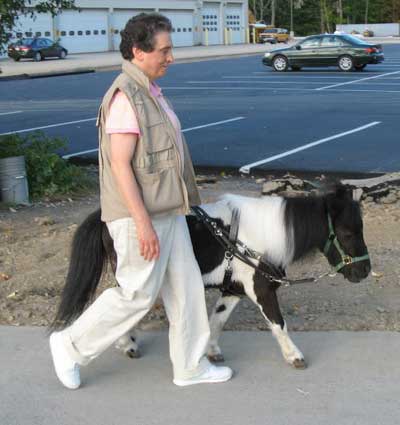
WVATS
Center for Excellence in Disabilities
West Virginia University
959 Hartman Run Road
Morgantown, WV 26505
Voice : 304-293-4692
Hotline: 800-841-8436
TTY: 800-518-1448
WVATS is funded by the US Department of Education, Rehabilitation Services Administration Contract# H224A100047
The Center for Excellence in Disabilities (CED) is designated as the state's lead agency for assistive technology services.
All printed materials are available in braille, electronic format, CD and large print. WVU is an Affirmative Action/Equal Opportunity Institution

